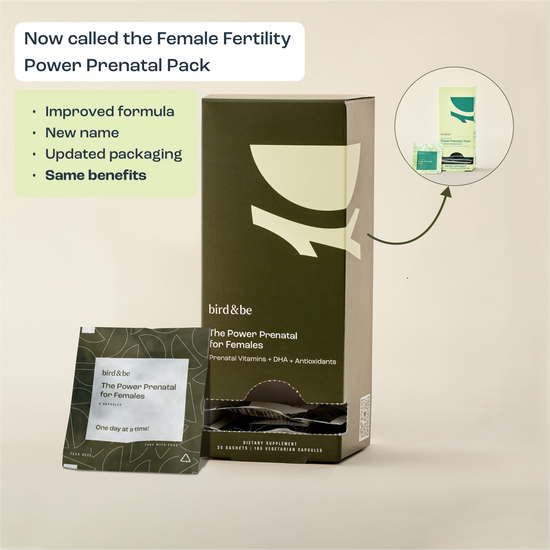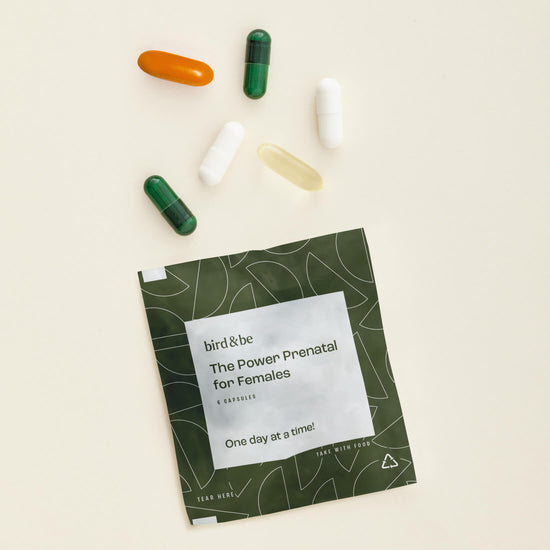If you’ve ever gone deep researching egg quality, chances are you’ve at least heard of It Starts With The Egg. Penned by science writer and IVF warrior Rebecca Fett, it’s one of the most popular fertility-helping books. In it, she breaks down the evidence and concludes that the right supplement can make all the difference in improving your egg health—and thus, odds of getting pregnant.
What are the key supplements It Starts With The Egg recommends for fertility?
- Folate
- Vitamin B12
- Vitamin B6
- Vitamin A
- Vitamin C
- Vitamin E
- Zinc
- Selenium
- Iodine
- CoQ10
- N-acetyl cysteine (NAC)
To cover all your bases, The Power Prenatal for Females includes all these nutrients and more—each at optimal doses and in bioavailable forms. Here, we dive into some of the most common questions about these ingredients.
What kind of Folate should I take?
Folate, also known as vitamin B9, naturally occurs in foods such as leafy greens. As a supplement, this nutrient can be found either in the form of Folic Acid or the more biologically active form called 5-Methyltetrahydrofolate (5-MTHF). About 25 percent of Americans have a specific genetic mutation that slows the metabolism of Folic Acid and prevents it from being transformed into the active 5-MTHF form, which is necessary for it to be properly used by the body.
Folate plays a key role in recycling a compound called homocysteine. In It Starts With The Egg, Fett explains that high homocysteine levels can increase DNA damage and may be associated with miscarriage. Having low levels of 5-MTHF, which is more common if you have that gene mutation, can increase homocysteine level and hurt your fertility.
Folate vs Folic Acid vs 5-MTHF: What You Need in Your Prenatal Vitamins →
But on the flip side, large-scale clinical studies have only studied Folic Acid’s ability to prevent neural tube defects. To help you get the best of both world’s—bioavailability plus research-backed results—we pack 400 mcg of Folic Acid and 600 mcg of 5-MTHF into our prenatal vitamins.
How much Vitamin B12 do I need for fertility?
Vitamin B12 also plays a major role in the cycle that reduces homocysteine levels. Like Folic Acid, it’s available in multiple forms including a more biologically active form called Methylcobalamin. In It Starts With The Egg, Fett writes that higher levels of Vitamin B12 have been associated with better embryo quality and that the combination of adequate Folate, Vitamin B12 and Vitamin B6 levels could increase the odds of pregnancy and decrease the odds of miscarriage. That’s why we’ve included 1,000 mcg of Methylcobalamin in all our prenatals designed for eggs, a higher level than what you’ll find in many other formulas.
Does everyone trying to get pregnant need CoQ10?
Coenzyme Q10 (CoQ10) can be found in the form of Ubiquinone and Ubiquinol. It gets those names because it’s a compound that’s ubiquitous in humans; it’s found in almost every single cell in the body.
CoQ10 is both an antioxidant and an energy booster for our cells. It’s most known for its role in the function of mitochondria, the batteries in our eggs. With aging, mitochondria can become damaged and CoQ10 levels decline. We tend to lose that “battery power,” which affects egg quality. Anyone who is trying to conceive could benefit from taking a CoQ10 supplement, but it’s especially helpful if you’re over the age of 30, have subfertility or a diminished egg reserve.
What is CoQ10—and Why Do I Need It? →
For those undergoing infertility treatments including IVF, the recommended doses start at 400 to 600 mg daily, but for most people who are just starting their fertility journey, Fett says a lower dose of 200 mg can be helpful and sufficient. To help limit how many different bottles you have to buy, we include 200 mg of CoQ10 in The Power Prenatal for Females, and you can add an extra 400 mg to your sachet with our Extra Egg Health Booster.
When should I start taking prenatal vitamins?
It’s best to start taking prenatal vitamins about three to four months before trying to conceive. This is because eggs (and sperm for that matter!) take roughly that amount of time to fully develop and mature. Starting this early before trying to get pregnant ensures that the supplements you’re taking will affect that next cohort of ovarian follicles for better quality when you ovulate that egg. If you were planning to try sooner, or if you’re preparing for an IVF cycle, these nutrient supplements can be started as soon as possible—even one or two months beforehand can be beneficial for egg quality.









